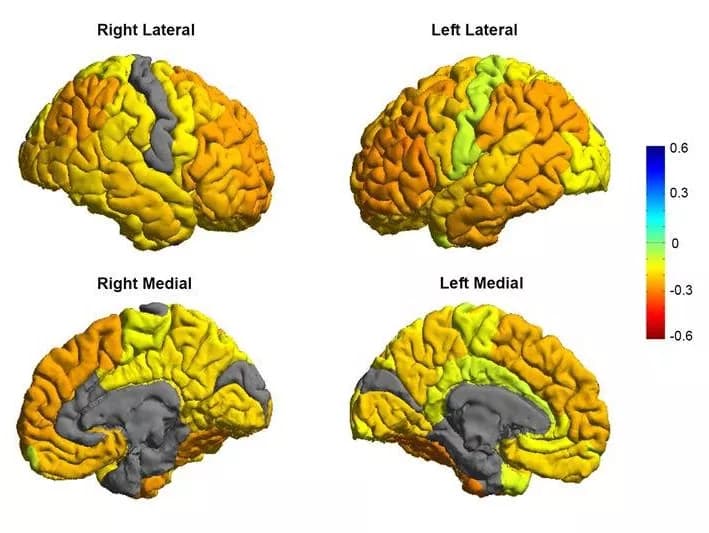
Global Bipolar Disorder Study Reveals Thinning Of Gray Matter In Brain Regions Responsible For Inhibition And Emotion
In the largest MRI study on patients with bipolar disorder to date, a global consortium published new research showing that people with the condition have differences in the brain regions that control inhibition and emotion.
The new study, published in Molecular Psychiatry on May 2, found brain abnormalities in people with bipolar disorder. By revealing clear and consistent alterations in key brain regions, the findings shed light on the underlying mechanisms of bipolar disorder.
"We created the first global map of bipolar disorder and how it affects the brain, resolving years of uncertainty on how people's brains differ when they have this severe illness," said Ole A. Andreassen, senior author of the study and a professor at the Norwegian Centre for Mental Disorders Research (NORMENT) at the University of Oslo.
Bipolar disorder affects 1 to 3 percent of the adult population worldwide. It is a debilitating psychiatric disorder with serious implications for those affected and their families. However, scientists have struggled to pinpoint neurobiological mechanisms of the disorder, partly due to the lack of sufficient brain scans.
The study was part of an international consortium called ENIGMA (Enhancing Neuro Imaging Genetics Through Meta Analysis), which spans 76 centers and includes 28 different research groups across the world, and is led by the USC Stevens Neuroimaging and Informatics Institute at the Keck School of Medicine of USC. The researchers measured the MRI scans of 6,503 individuals, including 2,447 adults with bipolar disorder and 4,056 healthy controls. They also examined the effects of commonly used prescription medications, age of illness onset, history of psychosis, mood state, age and sex differences on cortical regions.
The study showed thinning of cortical gray matter in the brains of patients with bipolar disorder when compared with healthy controls. The greatest deficits were found in parts of the brain that control inhibition and emotion -- the frontal and temporal regions.
Bipolar disorder patients with a history of psychosis showed greater deficits in the brain's gray matter. The findings also showed different brain signatures in patients who took lithium, antipsychotics and anti-epileptic treatments. Lithium treatment was associated with less thinning of gray matter, which suggests a protective effect of this medication on the brain.
"These are important clues as to where to look in the brain for therapeutic effects of these drugs," said Derrek Hibar, first author of the paper and a professor at the USC Mark and Mary Stevens Neuroimaging and Informatics Institute when the study was conducted. He was a former visiting researcher at the University of Oslo and is now a senior scientist at Janssen Research and Development, LLC.
"Mapping the brain regions affected is also important for early detection and prevention," said Paul Thompson director of the ENIGMA consortium and an associate director of the USC Mark and Mary Stevens Neuroimaging and Informatics Institute.
Future research will test how well different medications and treatments can shift or modify these brain measures as well as improve symptoms and clinical outcomes for patients.
"This new map of the bipolar brain gives us a roadmap of where to look for treatment effects. By bringing together psychiatrists worldwide, we now have a new source of power to discover treatments that improve patients' lives," said Thompson.
Materials provided by University of Oslo, Faculty of Medicine. Note: Content may be edited for style and length.
Disclaimer: DoveMed is not responsible for the accuracy of the adapted version of news releases posted to DoveMed by contributing universities and institutions.
Primary Resource:
Hibar, D. P., Westlye, L. T., Doan, N. T., Jahanshad, N., Cheung, J. W., Ching, C. R. K., ... & Krämer, B. (2017). Cortical abnormalities in bipolar disorder: an MRI analysis of 6503 individuals from the ENIGMA Bipolar Disorder Working Group. Molecular Psychiatry. DOI: 10.1038/mp.2017.73
Related Articles
Test Your Knowledge
Asked by users
Related Centers
Related Specialties
Related Physicians
Related Procedures
Related Resources
Join DoveHubs
and connect with fellow professionals

0 Comments
Please log in to post a comment.